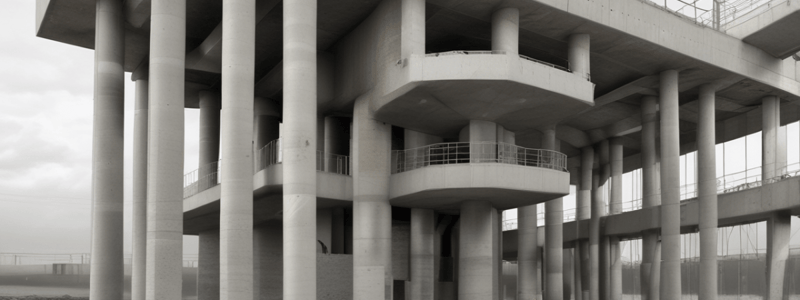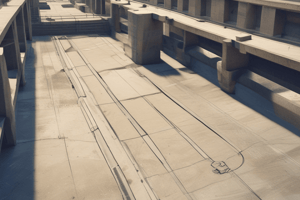Podcast
Questions and Answers
What is the primary property of hydraulic cements?
What is the primary property of hydraulic cements?
- Setting and hardening under water (correct)
- Absorbing water
- Conducting electricity
- Resisting water
What was the main material used by early Egyptians for cementing?
What was the main material used by early Egyptians for cementing?
- Limestone
- Gypsum (correct)
- Shale
- Chalk
Who is credited with the invention of Portland cement?
Who is credited with the invention of Portland cement?
- Joseph Aspdin's father
- Joseph Aspdin (correct)
- A Roman engineer
- An Indian architect
What was the name 'Portland' attributed to?
What was the name 'Portland' attributed to?
What was the process used by Joseph Aspdin to create Portland cement?
What was the process used by Joseph Aspdin to create Portland cement?
What type of materials does the definition of cement embrace?
What type of materials does the definition of cement embrace?
When did Joseph Aspdin take the patent of Portland cement?
When did Joseph Aspdin take the patent of Portland cement?
What are the two main components of Portland cement?
What are the two main components of Portland cement?
What is the general description of cement?
What is the general description of cement?
What percentage of the dry material becomes liquid in the hottest part of the kiln?
What percentage of the dry material becomes liquid in the hottest part of the kiln?
What is the resulting product after the dry material undergoes a series of chemical reactions?
What is the resulting product after the dry material undergoes a series of chemical reactions?
What is added to the clinker to prevent flash-setting of the cement?
What is added to the clinker to prevent flash-setting of the cement?
What is the main difference between the wet and dry processes of cement manufacture?
What is the main difference between the wet and dry processes of cement manufacture?
Which process is more economic due to lower fuel consumption?
Which process is more economic due to lower fuel consumption?
What is the advantage of the wet process in terms of mixing raw materials?
What is the advantage of the wet process in terms of mixing raw materials?
What is the main component of the raw materials used for the manufacture of cement?
What is the main component of the raw materials used for the manufacture of cement?
What is the reason for the difference in equipment size between the wet and dry processes?
What is the reason for the difference in equipment size between the wet and dry processes?
What is the main advantage of the dry process in terms of maintenance?
What is the main advantage of the dry process in terms of maintenance?
What is the recommended maximum size of particles in a sample of cement?
What is the recommended maximum size of particles in a sample of cement?
What is the average size of cement particles?
What is the average size of cement particles?
What percentage of particles in commercial cement should be less than 7 microns in size?
What percentage of particles in commercial cement should be less than 7 microns in size?
What is the main reason for unsoundness in cement?
What is the main reason for unsoundness in cement?
Why are strength tests not made on a neat cement paste?
Why are strength tests not made on a neat cement paste?
What is the most commonly used test for determining the strength of cement?
What is the most commonly used test for determining the strength of cement?
What is the purpose of field testing in cement?
What is the purpose of field testing in cement?
What should be the color of good quality cement?
What should be the color of good quality cement?
What should be the texture of cement when felt between the fingers?
What should be the texture of cement when felt between the fingers?
What is the minimum time required for complete hydration of cement?
What is the minimum time required for complete hydration of cement?
What is the approximate depth of hydration of cement grains after 28 days?
What is the approximate depth of hydration of cement grains after 28 days?
What is the maximum size of cement particles that can undergo complete hydration under normal conditions?
What is the maximum size of cement particles that can undergo complete hydration under normal conditions?
What is the product of the reaction of C3S and C2S with water that determines the good properties of concrete?
What is the product of the reaction of C3S and C2S with water that determines the good properties of concrete?
What percentage of the volume of solids in a completely hydrated cement paste is made up of Calcium Silicate Hydrates?
What percentage of the volume of solids in a completely hydrated cement paste is made up of Calcium Silicate Hydrates?
What is the undesirable product of the hydration of C3S and C2S?
What is the undesirable product of the hydration of C3S and C2S?
Why is C3S preferred in cold weather concreting?
Why is C3S preferred in cold weather concreting?
What is responsible for the later strength of concrete?
What is responsible for the later strength of concrete?
What is the reason for the lack of durability of concrete?
What is the reason for the lack of durability of concrete?
What is the characteristic of rapid-hardening Portland cement?
What is the characteristic of rapid-hardening Portland cement?
What is the difference between rapid-hardening and ordinary cement in terms of setting times?
What is the difference between rapid-hardening and ordinary cement in terms of setting times?
What is the recommended use of rapid-hardening Portland cement?
What is the recommended use of rapid-hardening Portland cement?
What is the reason for the increased rate of gain of strength of rapid-hardening Portland cement?
What is the reason for the increased rate of gain of strength of rapid-hardening Portland cement?
What is the characteristic of Type III cements in terms of fineness?
What is the characteristic of Type III cements in terms of fineness?
What is the purpose of using low heat Portland cement (Type IV)?
What is the purpose of using low heat Portland cement (Type IV)?
In which type of construction is rapid-hardening cement not suitable?
In which type of construction is rapid-hardening cement not suitable?
What is the benefit of using rapid-hardening Portland cement in cold weather concrete?
What is the benefit of using rapid-hardening Portland cement in cold weather concrete?
What is the specific use of low heat Portland cement (Type IV)?
What is the specific use of low heat Portland cement (Type IV)?
Flashcards are hidden until you start studying
Study Notes
What is Cement
- Cement is a material with adhesive and cohesive properties that bonds mineral fragments into a compact whole.
- Portland cement is a type of cement made from calcareous materials, alumina, and silica found as clay or shale.
Historical Background
- The history of cementing materials dates back to ancient Egyptian, Roman, and Indian constructions.
- Egyptians used cementing materials obtained by burning gypsum.
- Joseph Aspdin, a Leeds builder and bricklayer, invented Portland cement in 1824.
- Aspdin's process involved mixing and grinding hard limestone and clay, then calcining it in a furnace, resulting in clinker.
Manufacturing Process of Cement
- There are two processes of manufacturing cement: wet process and dry process.
- Wet process:
- Slurry contains 35-50% water.
- More fuel is required due to higher heat.
- Kiln and equipment are larger.
- Less maintenance due to low friction forces.
- Less economic due to high fuel consumption.
- Dry process:
- Quantity of water is about 12%.
- Less fuel is required due to lower heat.
- Equipment used is smaller.
- More maintenance required.
- More economic due to lower fuel consumption.
Chemical Composition of Portland Cement
- Raw materials consist mainly of lime, silica, alumina, and iron oxide.
- Complete hydration cannot be obtained within a year or more.
- Cement particles should be smaller than 50μ for complete hydration.
Calcium Silicate Hydrates (C-S-H)
- Formed during the reaction of C3S and C2S with water.
- C-S-H is the most important product, making up 50-60% of the volume of solids in a completely hydrated cement paste.
- C3S produces less C-S-H and more Ca(OH)2 than C2S.
- C2S hydrates slowly, responsible for later strength, and produces less heat of hydration.
Calcium Hydroxide (Ca(OH)2)
- Constitutes 20-25% of the volume of solids in the hydrated paste.
- Presence of Ca(OH)2 leads to lack of durability in concrete.
- Maximum particle size should be less than 100 microns, with an average size of about 10 microns.
Soundness of Cement
- Cement should not undergo significant volume changes after setting.
- Unsatisfactory soundness is caused by excess lime (CaO), magnesia (MgO), or excessive proportion of sulphates (CaSo4).
Strength of Cement
- Strength tests are usually conducted on cement-sand mortars due to difficulties in testing neat cement paste.
- Compressive strength is considered crucial, and sand-cement mortar tests are the most appropriate.
Testing of Cement
- Field testing includes:
- Visual inspection for lumps.
- Checking color (greenish grey).
- Feeling for temperature (cool).
- Feeling for smoothness (not gritty).
- Laboratory testing includes compressive strength tests.
Types of Portland Cement
- Rapid-hardening Portland cement (Type III):
- Develops strength more rapidly.
- High early strength cement.
- Not suitable for mass concrete construction or large structural sections due to higher rate of heat development.
- Low heat Portland cement (Type IV):
- Developed for use in mass concrete construction, such as dams.
- Limits rate of heat evolution to prevent cracking.
Studying That Suits You
Use AI to generate personalized quizzes and flashcards to suit your learning preferences.




